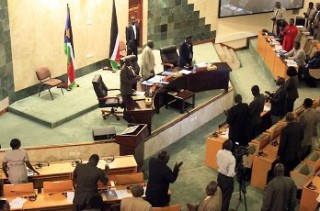Four S. Sudanese MPs join armed opposition movement
October 19, 2016 (JUBA) – Four South Sudanese lawmakers in the country’s national assembly have announced their defection to the armed opposition faction led by former First Vice-President, Riek Machar.

They include, Lam Puoch, from Nasir of the Upper Nile, Pasquale Clement Batali representing Nagero in Western Equatoria, Justin Joseph Marona of Maridi in Western Equatoria, and Martin Mabil Kong, from Rubktna in Unity region.
In a joint statement Sudan Tribune obtained, the defectors said recent waves of violence have watered down hopes and expectations from the people they represent in various constituencies, who, they say, are yearning for sustainable peace.
“Sadly, the breakout of the dog fight at presidential palace on July 8th 2016 marked the beginning of another era of senseless war. The fingers pointed largely on president [Salva] Kiir, and his JCE [Jieng Council of Elders] as primary instigators of the uncalled for violent”, partly reads the statement.
However, the lawmakers said the renewed violence in the national capital, Juba in July was a coordinated attack to assassinate the first vice president Riek Machar to abrogate the 2015 peace accord.
The legislators condemned the violation of peace agreement, alleging president Kiir was responsible after replacement of his peace partner, Machar with former rebel chief negotiator, Taban Deng Gai.
“We have witnessed the apparent lack of political will to implement peace and absence of meaningful role of the government in providing services, security and space of freedom of expressions in all spheres of lives”, the lawmakers further said in their joint statement.
The current Parliament, they claimed, does not function independently due to restrictions on lawmaker during debates, thus weakening legislators’ abilities to freely oppose any given motion.
(ST)
